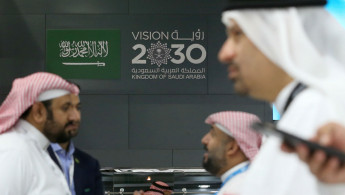Saudi Arabia to 'offer citizenship' to experts, creatives and clerics as part of 'reform drive'
Saudi Crown Prince Mohammad bin Salman's Vision 2030 reform drive has been criticised by rights organisations for whitewashing rights violations and a crackdown on critics.
3 min read
Saudi Arabia also launched 'golden visas' this year [AFP]
Saudi Arabia is to offer citizenship to experts and talented creatives as part of a bid to modernise and diversify the ultraconservative kingdom's economy, Saudi news site Sabq reported.
Saudi King Salman has reportedly issued a royal order allowing the naturalisation of qualified experts in fields ranging from tech and medicine to sports and the arts, the Saudi site said on Wednesday.
Islamic clerics will also be invited to take up Saudi citizenship, it added.
If realised, the move would see a major break from current Saudi citizenship law which only allows the naturalisation of foreign citizens who have held permenant residency in the kingdom for at least five years.
Steep fees, strict regulations and the requirement of a Saudi sponsor have long restricted foreigners living in the kingdom from gaining permenant residency permits.
Earlier this year, Riyadh eased those strict requirements, but only for the super rich - opening a pathway to so-called "golden visas" that require prospective residents to fork out 800,000 riyals ($213,000) for the right to permenant residency. The opening was geared towards affluent investors, doctors, engineers and financiers.
It is unclear whether the new regulations reported by Sabq will require prospective citizens to have been resident in Saudi Arabia for a minimum term.
Read more: Saudi crown prince's message is clear: Kingdom is open for business, not for political activism
The move to attract experts in fields including computer science, nuclear and renewable energy and artificial intelligence comes in tandem with controversial Crown Prince Mohammad bin Salman's Vision 2030.
The ambitious plan seeks to diversify and modernise the kingdom's economy for the post-oil era by expanding several key sectors, including the tourism, culture and tech industries.
The naturalisation opening also hopes to target scientists working in robots, nanotechnology and environmental science, aerospace engineers, medical doctors and creatives. Saudi Arabia is also seeking to attract water desalinisation experts.
However, the move will not represent a 180 degree turn for the ultraconservative kingdom, which will also reportedly offer citizenship to Islamic clerics and oil and gas engineers.
While many of the bold plans pegged to Vision 2030 - such as futuristic mega-city NEOM - are yet to be realised, women's rights reforms instigated over the past two years are also part of the plan.
Reforms including allowing women the right to drive and loosening travel restrictions have been slammed by human rights organisations who say the measures are hollow and have come at the expense of a widespread crackdown on dissent throughout the kingdom.
Bin Salman has been under increased international scrutiny since the brutal murder of journalist Jamal Khashoggi at the Saudi consulate in Istanbul last year.
Follow us on Twitter and Instagram to stay connected
Saudi King Salman has reportedly issued a royal order allowing the naturalisation of qualified experts in fields ranging from tech and medicine to sports and the arts, the Saudi site said on Wednesday.
Islamic clerics will also be invited to take up Saudi citizenship, it added.
If realised, the move would see a major break from current Saudi citizenship law which only allows the naturalisation of foreign citizens who have held permenant residency in the kingdom for at least five years.
Steep fees, strict regulations and the requirement of a Saudi sponsor have long restricted foreigners living in the kingdom from gaining permenant residency permits.
Earlier this year, Riyadh eased those strict requirements, but only for the super rich - opening a pathway to so-called "golden visas" that require prospective residents to fork out 800,000 riyals ($213,000) for the right to permenant residency. The opening was geared towards affluent investors, doctors, engineers and financiers.
It is unclear whether the new regulations reported by Sabq will require prospective citizens to have been resident in Saudi Arabia for a minimum term.
Read more: Saudi crown prince's message is clear: Kingdom is open for business, not for political activism
The move to attract experts in fields including computer science, nuclear and renewable energy and artificial intelligence comes in tandem with controversial Crown Prince Mohammad bin Salman's Vision 2030.
The ambitious plan seeks to diversify and modernise the kingdom's economy for the post-oil era by expanding several key sectors, including the tourism, culture and tech industries.
The naturalisation opening also hopes to target scientists working in robots, nanotechnology and environmental science, aerospace engineers, medical doctors and creatives. Saudi Arabia is also seeking to attract water desalinisation experts.
However, the move will not represent a 180 degree turn for the ultraconservative kingdom, which will also reportedly offer citizenship to Islamic clerics and oil and gas engineers.
While many of the bold plans pegged to Vision 2030 - such as futuristic mega-city NEOM - are yet to be realised, women's rights reforms instigated over the past two years are also part of the plan.
Reforms including allowing women the right to drive and loosening travel restrictions have been slammed by human rights organisations who say the measures are hollow and have come at the expense of a widespread crackdown on dissent throughout the kingdom.
Bin Salman has been under increased international scrutiny since the brutal murder of journalist Jamal Khashoggi at the Saudi consulate in Istanbul last year.
Follow us on Twitter and Instagram to stay connected





 Follow the Middle East's top stories in English at The New Arab on Google News
Follow the Middle East's top stories in English at The New Arab on Google News
![The UAE is widely suspected of arming the RSF militia [Getty]](/sites/default/files/styles/image_330x185/public/2024-11/GettyImages-472529908.jpg?h=69f2b9d0&itok=Yauw3YTG)
![Netanyahu furiously denounced the ICC [Getty]](/sites/default/files/styles/image_330x185/public/2024-11/GettyImages-2169352575.jpg?h=199d8c1f&itok=-vRiruf5)
![Both Hamas and the Palestinian Authority welcomed the ICC arrest warrants [Getty]](/sites/default/files/styles/image_330x185/public/2024-11/GettyImages-2178351173.jpg?h=199d8c1f&itok=TV858iVg)